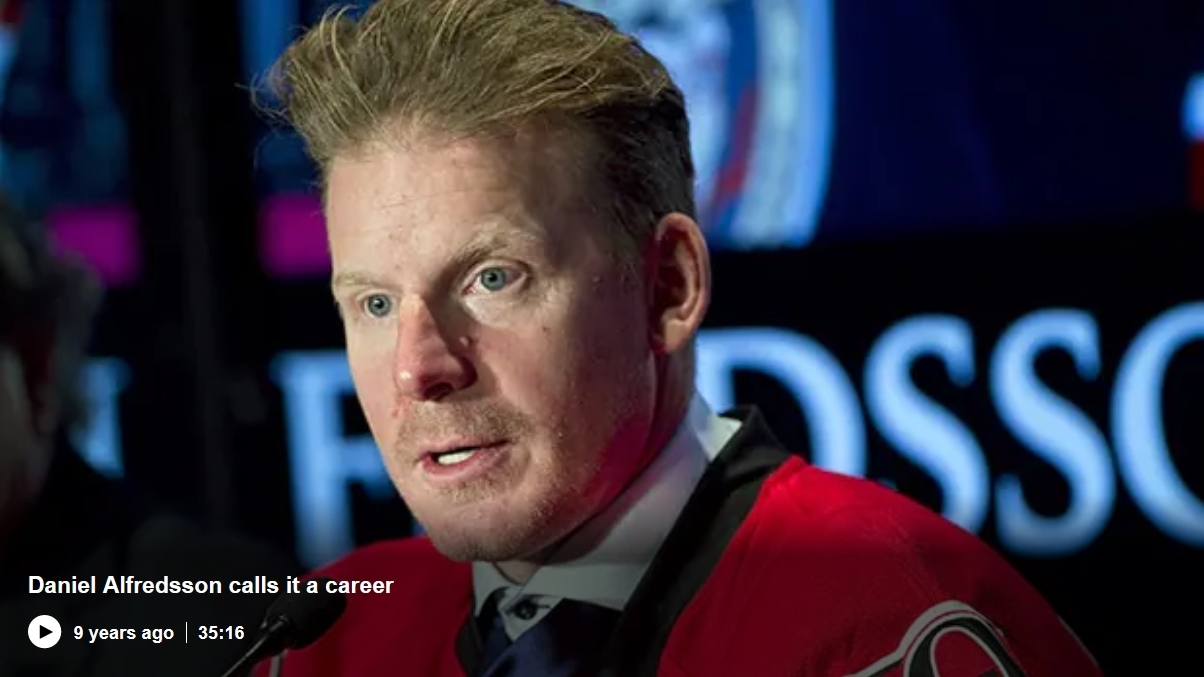On Friday, March 15, Los Angeles Rams defensive tackle Aaron Donald announced his retirement from the National Football League (NFL) after a 10-year career that saw three Defensive Player of the Year awards, 10 All-Pro nominations and a Super Bowl win.

Image from Los Angeles Rams via a since-deleted Instagram post.
As a lifelong Rams fan who watched Donald’s storied career from first snap to last, I spent the following several hours reflecting on his legacy, his impact on the team and on the sport in general, and convincing myself that, actually, losing arguably the greatest defensive player of all-time isn’t that big of a blow to the team’s playoff chances next season.
(Can you tell I was unsuccessful in convincing myself?)
Anyway, the following day, it occurred to me that the announcement was both notable and worth discussing here, because the initial announcement was made via Donald’s X account:
Using X to disseminate news widely is fairly common practice in today’s landscape. Yes, the message eventually filters through to other channels, traditional print and broadcast media eventually. But for those who want to be in the know as quickly as possible, X still seems like the place to be. For news and professional microblogging, X remains the gold standard (even as the platform seems to be moving away from ease of personal use, but I digress.)
That’s why this announcement got my gears turning — a player announcing retirement creates an intersection between personal and professional that isn’t always present in social media messaging. On the latter, of course there’s an expectation that information will be shared widely through professional channels, as it was. But on the former front, one can and probably should reasonably expect a bit more of a personal touch.
Retirement via Press Conference
Witness, in contrast, Ottawa Senators and Detroit Red Wings legend Daniel Alfredsson announcing his retirement from the National Hockey League (NHL) in 2014, via CBC:

This press conference style was the far more common outlet for major personal announcements from athletes in the pre-social media era and during its formative years, but even at the time of this retirement the tides had started shifting to a more social media-centric approach — see examples below.
The Senators sent out a press release and the usual professional communications efforts, but the personal aspect was felt in Alfredsson’s physical presence, in hearing him speak, and in the questions reporters were able to ask in real-time.
Other examples of major personal moments playing out via press conference include then-Edmonton Oilers captain Ryan Smyth finding out he had been traded, then-Oilers captain Wayne Gretzky finding out he had been traded and, in a break from what seems to be a current trend, former Philadelphia Eagles center Jason Kelce announcing his retirement from the NFL via press conference less than two weeks ago.
In all of the above, there’s no question that there are elements — powerful, emotional moments — which simply cannot translate well to a written statement.
Retirement via Social Media
Looking at Donald’s announcement, I can’t help but feel torn. On the one hand, he got to announce his retirement on his own terms, in his own words. By being the first person to share this news, he got to control the narrative rather than have it defined by an insider leaking the story.
On the other hand… it does feel a little empty, doesn’t it? Words on an image — evocative words, to be sure, but words nonetheless. No sense of the emotion that must have gone into them, nor any opportunity for follow-up quotes or thoughts.
Compare Donald’s retirement tweet with the clips linked in the previous section, and it’s fairly evident that something can be lost in translation through an announcement rather than a press conference.
It’s sure hard to fault a person who spent much of his career in front of cameras, graciously spending time sharing thoughts with reporters, deciding to take a step back and let the moment speak for itself. To me, though, the moment’s impact felt more like a sudden and abrupt stop than the celebration of a man’s legacy.
Other examples of this method being used include announcements from former National Basketball Association standout Shaquille O’Neal, NFL stalwarts J.J. Watt and Tom Brady, and boxer Shane Mosley.
Person, Profession, Brand
Ultimately, tying back to the professional vs. personal point, I think there’s a unique intersection in any kind of public-facing job that ties in to this week’s module: people themselves are a brand. My discussion of this topic, up until this point, has focused on these being two separate elements.
But in Donald, in Alfredsson, in any number of actors, politicians, musicians, artists… the personal and the brand are one and the same.
So, then, this becomes less of a “separating the personal from the professional” focus and more of a discussion around an individual positioning their brand in social media space, which is unquestionably a topic that has gained more profile with the advent and subsequent dominance of social media as an outreach tool.
What do you think: is there a heightened focus on how a message is perceived in the social media era? Or are we merely looking at the same discussion through a new lens? Sound off in the comments!

Patrick Smith
I am a graduate of Algonquin College’s Journalism and Interactive Media Management programs. I work as a project manager at a national not-for-profit organization, with job responsibilities that include social media management.
Suggested social media posts:
Facebook: Los Angeles Rams star DT Aaron Donald announced his retirement from the NFL using his X account, which made me think back to memorable sports press conferences and wonder: are we losing something in the era of retirements announced through social media? https://algonquincollegesocialmedia.wordpress.com/2024/03/18/purposeful-personal-and-professional-positioning/
X/Twitter: With @AaronDonald97 announcing his retirement on this platform, I couldn’t help but wonder: are tweeted statements a true replacement for the traditional press conference retirement? #RamsHouse #AD99 https://bit.ly/43pi4Jq
(character count: 222)
This was an interesting topic and I enjoyed reading what you had to say.
I think that there is more focus on how a message is perceived in the social media era. For example, you said that you felt Donald’s announcement was a bit empty. Just words and no connection. Meanwhile, I would say that social media is a way for Donald to make an announcement directly to his fans and create a deeper connection. I guess that would be our difference in perception right? I would hear an announcement like this and think that he wanted to share the news directly with his fans and will do more professional interviews later to answer any further questions journalists might have.
As it turns out, your last sentence is bang-on! A few days after I posted, Donald tweeted this on his main account: https://twitter.com/AaronDonald97/status/1770568418036789613
I think to me, as someone with a journalism background, I feel a bit uncomfortable with the idea of someone staging their own interview with their own questions and their own interviewers — it feels more like controlled messaging than genuine attempt at connection — but it already does feel miles better that there’s some follow-up. Sure hard to be upset at the medium with the knowledge that there’s more coming.
As a big JJ Watt fan I wish his announcement was a little more personal. We, as fans, spend a lot of time watching and cheering for these athletes. And most of the time you get some glimpses into their life outside of sport and ultimately make a better connection. I think it’s athletes that nurture their connection with fans that gain the best following, Jason Kelce is a great example. So yes, I do think there is a heightened focus on how a message is perceived.
I couldn’t agree more! There’s definitely room in sports for the stoic, show-up-and-do-my-job-type, and J.J. Watt SO fit that bill. Absolute warrior on the field. But when players show their human side — something that, in theory, social media was supposed to accentuate — it makes them more than JUST an athlete to their fans.